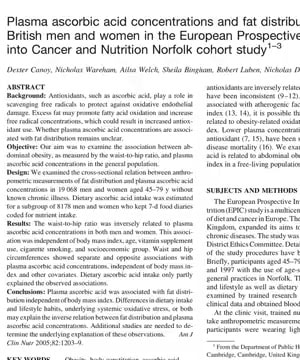vitamina C
Sources:
Vitamin C plays a crucial role in various aspects of human health, including immunity, respiratory health, and fat metabolism.
Fat Metabolism
explains that vitamin C influences fat metabolism by aiding fatty acid oxidation, which is essential for utilizing fats as an energy source. Studies in humans and animals suggest that higher vitamin C levels can help reduce body fat and may be beneficial for weight management by enhancing the body's ability to break down fats 1.
Respiratory Health
Vitamin C may also protect against respiratory diseases by reducing oxidative stress in the lungs and enhancing immune cell function. It has been shown to potentially lower the risk of developing respiratory conditions and decrease the duration of mechanical ventilation in patients with respiratory failure 2.
General Health
Overall, emphasizes the importance of maintaining adequate vitamin C levels for optimal health benefits, including support for the immune system and potential protective effects against various diseases 1.
RELATED QUESTIONSCan you explain the role of vitamin C in fat metabolism?
Sources:
Vitamin C plays a significant role in fat metabolism, primarily through its involvement in the process of fatty acid oxidation. This process is crucial for utilizing fat as an energy source, often referred to as fat burning. discusses several mechanisms through which vitamin C influences fat metabolism:
-
Fatty Acid Oxidation: Vitamin C is essential for the synthesis of carnitine, a compound that is vital for the transport and breakdown of fatty acids into the mitochondria for energy production. This process is crucial for the efficient utilization of fats as an energy source.
-
Influence on Body Fat and Weight Management: Vitamin C levels have been shown to be inversely correlated with body fat. This relationship is particularly significant in obese individuals. High vitamin C intake has been associated with a reduced rate of weight gain, especially in terms of fat mass, in animal studies.
-
Impact on Fat Utilization During Exercise: Human studies indicate that individuals with adequate vitamin C levels tend to have better fat oxidation rates during exercise compared to those with lower vitamin C levels. Supplementation with vitamin C significantly improved fat utilization among participants with previously low vitamin C status.
-
General Metabolic Impact: In models of metabolic diseases, such as in mice with Werner syndrome (a genetic disorder characterized by premature aging), vitamin C supplementation not only helped in managing metabolic diseases but also increased the lifespan of these mice. Supplemented mice showed higher levels of PPAR alpha, a key regulator of fat metabolism.
These findings underscore the importance of maintaining adequate vitamin C levels for effective fat metabolism, weight management, and overall metabolic health 1.
RELATED QUESTIONS-

